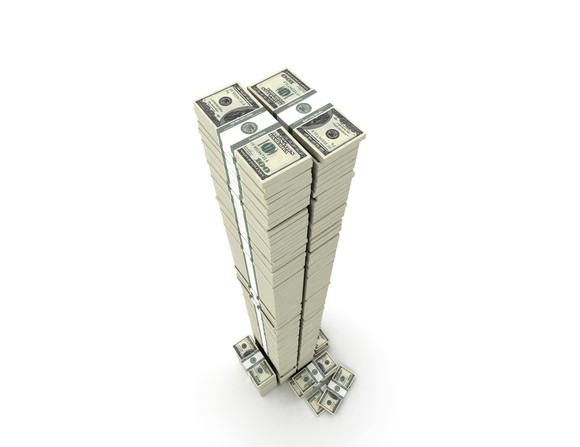Few big drugmakers have forged as many strategic partnerships as Celgene (NASDAQ:CELG). At last count, the biotech had 47 partners and collaborators -- including its most recent collaboration deal with BeiGene.
Many investors might not realize just how much money Celgene has riding on some of these partnerships. Just look at three of the companies with which Celgene is collaborating -- Acceleron Pharma (NASDAQ:XLRN), bluebird bio (NASDAQ:BLUE), and Juno Therapeutics (NASDAQ:JUNO). If these three small biotechs are successful, Celgene stands to make billions of dollars.

IMAGE SOURCE: GETTY IMAGES.
Acceleron
Celgene and Acceleron first teamed up in 2008. Three years later, the two companies expanded their partnership to include development of Acceleron's experimental drug luspatercept (also known as ACE-536.)
Luspatercept is now in two late-stage studies. One targets treatment of anemia in patients with myelodysplastic syndromes (MDS). The other focuses on treating beta-thalassemia. The experimental drug has shown significant promise in both indications.
Celgene thinks that luspatercept could potentially gain regulatory approval in 2019 (most likely for beta thalassemia first, since the late-stage study targeting this indication completes earlier than the MDS study). If approved, the big biotech projects peak annual revenue of at least $2 billion. Acceleron stands to receive tiered double-digit royalties in addition to milestone payments.
Bluebird Bio
Bluebird Bio attracted Celgene's attention back in 2013. The two companies signed a deal to apply Bluebird's gene therapy technology to genetically modify T cells to target and destroy cancer cells. In 2015, Celgene and Bluebird expanded their collaboration to include developing product candidates targeting B-cell maturation antigen (BCMA). A year later, Celgene exercised its option on one of those BCMA candidates, bb2121.
That turned out to be a smart move. At the American Society of Clinical Oncology (ASCO) meeting last month, Celgene and Bluebird presented encouraging results from a phase 1 study of bb2121 in treating multiple myeloma.
There are still plenty of hurdles remaining for bb2121. However, Celgene thinks the drug could potentially gain approval by 2020. If bb2121 does achieve this goal, the biotech expects the drug to eventually make $1 billion or more per year. That estimate could be pessimistic: BMO Capital analyst Matthew Luchini projects peak sales of $3.6 billion.

IMAGE SOURCE: GETTY IMAGES.
Juno Therapeutics
In 2015, Celgene forged another relationship with a small biotech specializing in treating cancer via chimeric antigen receptor T-cell (CAR-T) therapies -- Juno Therapeutics. The deal involved collaboration on several of Juno's immunotherapy candidates. In addition, Celgene bought around 9.1 million shares of Juno stock.
This partnership seemed like it might have been a mistake last year. The Food and Drug Administration placed Juno's lead program at the time, JCAR015, on clinical hold. That hold was later lifted, but Juno ultimately canceled development of the CAR-T drug after several patients in a clinical study died. All wasn't lost, though. Juno forged ahead with another candidate, JCAR017. The biotech reported positive data at the ASCO meeting in June from an early-stage study of the drug in treating aggressive B-cell non-Hodgkin lymphoma.
Safety issues are still a concern for JCAR017, though. But if all goes well in clinical testing, Celgene thinks the drug could win approval by 2019. The company estimates that, if approved, JCAR017 could reach peak annual sales of more than $1 billion.
Hitting the trifecta?
If we combine all three of these experimental drugs, Celgene could be looking at additional annual revenue of more than $4 billion in the next decade. That's more than Celgene's four top-selling drugs after Revlimid currently make.
What are the chances that Celgene will hit the trifecta and see success for all three drugs? It's hard to say. Luspatercept appears to be the least risky candidate, since it's in late-stage testing. JCAR017 is probably the most risky, considering the safety concerns associated with Juno's CAR-T drugs.
Celgene has billions of dollars riding on the success of Acceleron, Bluebird, and Juno. We'll probably know over the next couple of years just how much these small biotechs are likely to add to Celgene's fortunes.
10 stocks we like better than Celgene
When investing geniuses David and Tom Gardner have a stock tip, it can pay to listen. After all, the newsletter they have run for over a decade, Motley Fool Stock Advisor, has tripled the market.*
David and Tom just revealed what they believe are the ten best stocks for investors to buy right now... and Celgene wasn't one of them! That's right -- they think these 10 stocks are even better buys.









